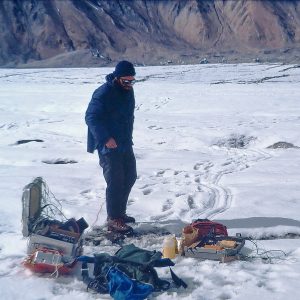This page is simple an example of one way to profile alumni or other professionals.
Francis Jones, MSc, Geophysicist

Previously: electrical engineer; oil/gas well-logging engineer, mineral exploration instrumentation developer, consulting geophysicist, geophysics/geoscience educator.
Currently: geoscience education development specialist in UBC’s Department of Earth, Ocean and Atmospheric Sciences (professional web page).
Career pathway

A new (in 1986) portable ice-depth radar instrument measuring glacier thickness being tested over a seasonal subglacial lake under the margin of the Kaskawulsh Glacier, Yukon Territory (60°46’32.2″N 139°07’36.3″W). This satisfying combination of physics, instrumentation, fieldwork and data science contributed towards understanding glacier drainage and resulting annual flooding.
An early interest in technology led initially to an electrical engineering degree. After 2 years applying new skills outdoors in the oil/gas industry, I started an MSc degree in geophysics at UBC, developing a portable ice-depth radar system for glacier research. The list of job titles above shows that this technical and Earth science background has enabled 35 years (and counting!) of satisfying and diverse professional activities.
Rewards and examples
Applying math, physics, computing and engineering to address important challenges is the biggest reward. For example, ice-depth radar is now commonly used for climate studies, water-source investigations, hazard assessments and other applications. Designing new tools & techniques for mineral exploration and geotechnical geophysics enables more effective and responsible work related to meeting society’s needs for resources and infrastructure.
Providing expertise in support of community projects is always particularly satisfying. In one consulting job, I provided field and technical expertise to complete a magnetic survey over an Alaskan community’s coastal lagoon which helped clean up masses of metallic waste left by decades of military activity.
And now, developing and sharing educational best-practices tailored for geoscience learning (especially geophysics) is helping improve the learning that future geoscientsts need to address the challenges at the intersection of humanity and our Planet Earth.
